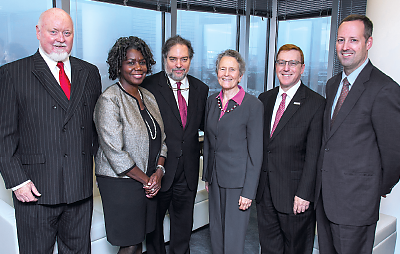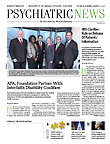APA, the American Psychiatric Foundation (APF), and the Interfaith Disability Advocacy Coalition (IDAC)—a program of the American Association of People with Disabilities (AAPD)—have formed a partnership to reduce stigma associated with mental health conditions and foster dialogue between psychiatrists and leaders in the faith community.
APF Executive Director Paul Burke; Ginny Thornburgh, director of the AAPD Interfaith Initiative; and Curtis Ramsey-Lucas, a representative from the American Baptist Home Mission Societies to the IDAC said in a joint statement that the partnership can be a learning opportunity for both psychiatrists and faith leaders and their congregants.
“Faith and spirituality can be important sources of hope, healing, belonging, and wholeness,” they said. “The time is right for professionals in the field of psychiatry and for leaders in the faith community to work more collaboratively and to serve people with mental illnesses in new and powerful ways.”
Burke, in a statement to Psychiatric News, added, “The American Psychiatric Foundation is proud to play an active role in this important work.”
APA CEO and Medical Director Saul Levin, M.D., M.P.A., hailed the new partnership. “I am excited about this partnership because psychiatrists, members, and leaders of faith communities have so much to offer each other. As head of the District of Columbia Department of Health, I witnessed how a D.C. faith-based initiative significantly promoted HIV testing and treatment among women, and I hope that this dialogue with faith communities has a similar, positive effect in helping individuals with a mental illness seek treatment.”
According to the partners, beginning in 2014, APA, APF, and IDAC will bring together faith and psychiatric leaders from across the country to do the following:
Establish an ongoing dialogue between psychiatrists and clergy.
Survey organizations and resources that are already active at the intersection of mental health and faith.
Create new resources to train religious leaders about mental health issues.
Create new resources that are useful to psychiatrists about faith and faith communities in mental health recovery.
Acknowledge and address the stress and mental health needs of clergy.
Improve mental health education offered in seminaries and pastoral and continuing education programs.
Explore ways for medical schools and psychiatric residency training programs to address the importance of faith and spirituality communities as a component of mental health recovery.
Sponsor an APF meeting in the late spring at APA headquarters in Arlington, Va., which could lead to a symposium at APA’s 2014 Institute on Psychiatric Services in San Francisco.
Provide guests and information for a potential episode of the public television series “Healthy Minds” to highlight the importance of collaboration between psychiatrists and leaders of the faith community.
APA President-elect Paul Summergrad, M.D., emphasized that the partnership is an extension of other “bridge-building” initiatives of the foundation, such as the Judicial-Psychiatric Leadership Forum held at last year’s annual meeting in Philadelphia and the “Typical or Troubled?” program that trains school personnel on how to identify potential mental health problems and then refer students to mental health services as needed.
In an interview with Psychiatric News, Summergrad said both sides of the new partnership have something to learn from each other.
“We know that many individuals experiencing mental health problems will seek out ministers, priests, pastors, rabbis, imams, or other spiritual leaders first,” Summergrad said. “So we think there is an opportunity for us to reach out to an important group and to provide the best science underlying the recognition and treatment of psychiatric disorders and to talk about the role of psychiatry in treating mental illness and how we can work together.
“But importantly, it’s also an opportunity for us to learn from them because we know that for many individuals and groups in the United States, faith can offer people with mental illness a supportive and nurturing community.”
He added that the effort will complement APA’s other endeavors to reach out to the faith community, such as “OMNA on Tour,” a traveling program aimed at raising awareness about mental health disparities among diverse and underserved populations and collaborating with communities to develop strategies to eliminate disparities. The program, sponsored by the Division of Diversity and Health Equity (formerly known as the Office of Minority and National Affairs) has frequently engaged faith community leaders in collaborative efforts to raise awareness about mental illness and the importance of seeking help from psychiatrists and mental health professionals in underserved communities.
“We’ve done this because for many of our populations of focus—not just the African-American community—the first stop by people experiencing psychological distress is with a faith community leader, because that leader is likely to be a trusted person in the individual’s life,” said Annelle Primm, M.D., APA deputy medical director and director of the Division of Diversity and Health Equity. “From a public-health perspective, the faith community is a gatekeeper. This means there is a window for informed faith community leaders to endorse the importance of psychiatric care. A good relationship between the psychiatric and faith communities is important as a way of making sure people of faith get the professional services they require.”
AAPD is the largest organization representing individuals with disabilities. IDAC has 32 member organizations, some of whom include the American Baptist Home Mission Societies, American Muslim Health Professionals, Interfaith Network on Mental Illness, Jewish Federations of North America, National Catholic Partnership on Disability, and the Sikh Coalition.
Ramsey-Lucas, who is the managing director of resource development at American Baptist Home Mission Societies and is coordinating IDAC’s partnership with APF, echoed many of the themes outlined by Summergrad and Primm. “The promise of this partnership is that it brings APA—an established and well-respected organization—together with the breadth of the religious community represented in IDAC,” he said.
The partnership had its genesis when Summergrad and Ramsey-Lucas met last year at the White House National Conference on Mental Health, hosted by the Obama administration to address gun violence and school shootings.
“I hope that we will be able to reduce the stigma associated with mental health conditions and improve community-based services and supports for individuals and families,” Ramsey-Lucas told Psychiatric News. “And we hope that we can establish an ongoing dialogue between psychiatrists and clergy that leads to the development of networks and of mutual support and understanding.”
He added that data show that roughly a third of clergy advise individuals with bipolar disorder or other severe and persistent mental illnesses that their condition can be addressed through prayer alone.
“We hope this partnership can help to change some of those statistics and attitudes and help people of faith to be more comfortable in seeking help,” Ramsey-Lucas said. ■

